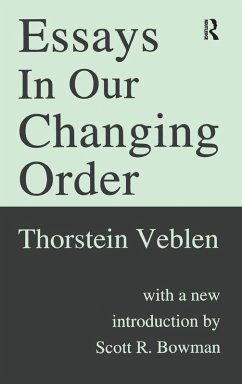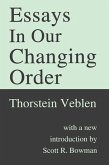Thorstein Veblen
Essays in Our Changing Order
Thorstein Veblen
Essays in Our Changing Order
- Gebundenes Buch
- Merkliste
- Auf die Merkliste
- Bewerten Bewerten
- Teilen
- Produkt teilen
- Produkterinnerung
- Produkterinnerung
Essays in Our Changing Order is the ninth volume in the collected works of America's pre-eminent social scientist
Andere Kunden interessierten sich auch für
![Essays in Our Changing Order Essays in Our Changing Order]() Thorstein VeblenEssays in Our Changing Order67,99 €
Thorstein VeblenEssays in Our Changing Order67,99 €![The General Theory of Economic Evolution The General Theory of Economic Evolution]() Kurt DopferThe General Theory of Economic Evolution221,99 €
Kurt DopferThe General Theory of Economic Evolution221,99 €![Remapping Gender in the New Global Order Remapping Gender in the New Global Order]() Brodie Dr Janine / Habiba Zaman (eds.)Remapping Gender in the New Global Order188,99 €
Brodie Dr Janine / Habiba Zaman (eds.)Remapping Gender in the New Global Order188,99 €![People, Place and Global Order People, Place and Global Order]() Andrew TaylorPeople, Place and Global Order166,99 €
Andrew TaylorPeople, Place and Global Order166,99 €![Individualism and the Social Order Individualism and the Social Order]() Charles McCannIndividualism and the Social Order168,99 €
Charles McCannIndividualism and the Social Order168,99 €![Evolution, Order and Complexity Evolution, Order and Complexity]() Kenneth BouldingEvolution, Order and Complexity214,99 €
Kenneth BouldingEvolution, Order and Complexity214,99 €![Order and Control in American Socio-Economic Thought Order and Control in American Socio-Economic Thought]() Charles McCannOrder and Control in American Socio-Economic Thought181,99 €
Charles McCannOrder and Control in American Socio-Economic Thought181,99 €-
-
-
Essays in Our Changing Order is the ninth volume in the collected works of America's pre-eminent social scientist
Produktdetails
- Produktdetails
- Verlag: Routledge
- Seitenzahl: 538
- Erscheinungstermin: 19. Februar 2018
- Englisch
- Abmessung: 235mm x 157mm x 33mm
- Gewicht: 921g
- ISBN-13: 9781138523029
- ISBN-10: 113852302X
- Artikelnr.: 57055457
- Herstellerkennzeichnung
- Libri GmbH
- Europaallee 1
- 36244 Bad Hersfeld
- gpsr@libri.de
- Verlag: Routledge
- Seitenzahl: 538
- Erscheinungstermin: 19. Februar 2018
- Englisch
- Abmessung: 235mm x 157mm x 33mm
- Gewicht: 921g
- ISBN-13: 9781138523029
- ISBN-10: 113852302X
- Artikelnr.: 57055457
- Herstellerkennzeichnung
- Libri GmbH
- Europaallee 1
- 36244 Bad Hersfeld
- gpsr@libri.de
Thorstein Bunde Veblen (July 30, 1857 - August 3, 1929) was an influential American economist and sociologist, renowned for his critical analysis of capitalism and his contributions to institutional economics. Veblen's most famous work, The Theory of the Leisure Class (1899), introduced the concepts of "conspicuous consumption" and "conspicuous leisure," which critique the extravagant display of wealth and status by the upper class. His work examined how the wealthy class's consumption patterns are driven by the desire to show social superiority rather than for practical use, and he argued that this behavior leads to societal inefficiency and waste. Veblen's theories also laid the groundwork for the institutional economics perspective, emphasizing the role of institutions, such as laws, customs, and social structures, in shaping economic behavior. He distinguished between "institutions" and "technology," a framework known as the Veblenian dichotomy, which remains influential in contemporary economic thought. Veblen's critiques of capitalism, alongside his focus on the broader societal context in which economic activities occur, have made him a significant figure in the field of economics and sociology.
Introduction
Essays in Economics
Economic Theory in the Calculable Future
Mr. Cummings's Strictures on "The Theory of the Leisure Class"
The Beginnings of Ownership
The Barbarian Status of Women
The Economic Theory of Woman's Dress
The Instinct of Workmanship and the Irksomeness of Labor
The Army of the Commonweal
"The Overproduction Fallacy"
Credit and Prices
Bohm-Bawerk's Definition of Capital
and the Source of Wages
Fisher's Rate of Interest
Fisher's Capital and Income
II. Miscellaneous Papers
Kant's Critique of Judgment
Arts and Crafts
Christian Morals and the Competitive System
The Intellectual Pre-eminence of Jews in Modern Europe
An Experiment in Eugenics
III. War Essays
Japanese Lose Hope for Germany
The Opportunity of Japan
Menial Servants during the Period of the War
Farm Labor for the Period of the War
Farm Labor and the I.W.W
The War and Higher Learning
A Memorandum on a Schedule of Prices for the Staple Foodstuffs
Suggestions Touching the Working Program of an Inquiry into the Prospective
Terms of Peace
Outline of a Policy for the Control of the "Economic Penetration" of Backwar Countries and of Foreign Investments
The Passing of National Frontiers
A Policy of Reconstruction
Bolshevism Is a Menace-to Whom? Peace
Dementia Prucox
Between Bolshevism and War
Editorials from 'The Dial" The Economic Consequences of the Peace
Essays in Economics
Economic Theory in the Calculable Future
Mr. Cummings's Strictures on "The Theory of the Leisure Class"
The Beginnings of Ownership
The Barbarian Status of Women
The Economic Theory of Woman's Dress
The Instinct of Workmanship and the Irksomeness of Labor
The Army of the Commonweal
"The Overproduction Fallacy"
Credit and Prices
Bohm-Bawerk's Definition of Capital
and the Source of Wages
Fisher's Rate of Interest
Fisher's Capital and Income
II. Miscellaneous Papers
Kant's Critique of Judgment
Arts and Crafts
Christian Morals and the Competitive System
The Intellectual Pre-eminence of Jews in Modern Europe
An Experiment in Eugenics
III. War Essays
Japanese Lose Hope for Germany
The Opportunity of Japan
Menial Servants during the Period of the War
Farm Labor for the Period of the War
Farm Labor and the I.W.W
The War and Higher Learning
A Memorandum on a Schedule of Prices for the Staple Foodstuffs
Suggestions Touching the Working Program of an Inquiry into the Prospective
Terms of Peace
Outline of a Policy for the Control of the "Economic Penetration" of Backwar Countries and of Foreign Investments
The Passing of National Frontiers
A Policy of Reconstruction
Bolshevism Is a Menace-to Whom? Peace
Dementia Prucox
Between Bolshevism and War
Editorials from 'The Dial" The Economic Consequences of the Peace
Introduction
Essays in Economics
Economic Theory in the Calculable Future
Mr. Cummings's Strictures on "The Theory of the Leisure Class"
The Beginnings of Ownership
The Barbarian Status of Women
The Economic Theory of Woman's Dress
The Instinct of Workmanship and the Irksomeness of Labor
The Army of the Commonweal
"The Overproduction Fallacy"
Credit and Prices
Bohm-Bawerk's Definition of Capital
and the Source of Wages
Fisher's Rate of Interest
Fisher's Capital and Income
II. Miscellaneous Papers
Kant's Critique of Judgment
Arts and Crafts
Christian Morals and the Competitive System
The Intellectual Pre-eminence of Jews in Modern Europe
An Experiment in Eugenics
III. War Essays
Japanese Lose Hope for Germany
The Opportunity of Japan
Menial Servants during the Period of the War
Farm Labor for the Period of the War
Farm Labor and the I.W.W
The War and Higher Learning
A Memorandum on a Schedule of Prices for the Staple Foodstuffs
Suggestions Touching the Working Program of an Inquiry into the Prospective
Terms of Peace
Outline of a Policy for the Control of the "Economic Penetration" of Backwar Countries and of Foreign Investments
The Passing of National Frontiers
A Policy of Reconstruction
Bolshevism Is a Menace-to Whom? Peace
Dementia Prucox
Between Bolshevism and War
Editorials from 'The Dial" The Economic Consequences of the Peace
Essays in Economics
Economic Theory in the Calculable Future
Mr. Cummings's Strictures on "The Theory of the Leisure Class"
The Beginnings of Ownership
The Barbarian Status of Women
The Economic Theory of Woman's Dress
The Instinct of Workmanship and the Irksomeness of Labor
The Army of the Commonweal
"The Overproduction Fallacy"
Credit and Prices
Bohm-Bawerk's Definition of Capital
and the Source of Wages
Fisher's Rate of Interest
Fisher's Capital and Income
II. Miscellaneous Papers
Kant's Critique of Judgment
Arts and Crafts
Christian Morals and the Competitive System
The Intellectual Pre-eminence of Jews in Modern Europe
An Experiment in Eugenics
III. War Essays
Japanese Lose Hope for Germany
The Opportunity of Japan
Menial Servants during the Period of the War
Farm Labor for the Period of the War
Farm Labor and the I.W.W
The War and Higher Learning
A Memorandum on a Schedule of Prices for the Staple Foodstuffs
Suggestions Touching the Working Program of an Inquiry into the Prospective
Terms of Peace
Outline of a Policy for the Control of the "Economic Penetration" of Backwar Countries and of Foreign Investments
The Passing of National Frontiers
A Policy of Reconstruction
Bolshevism Is a Menace-to Whom? Peace
Dementia Prucox
Between Bolshevism and War
Editorials from 'The Dial" The Economic Consequences of the Peace









